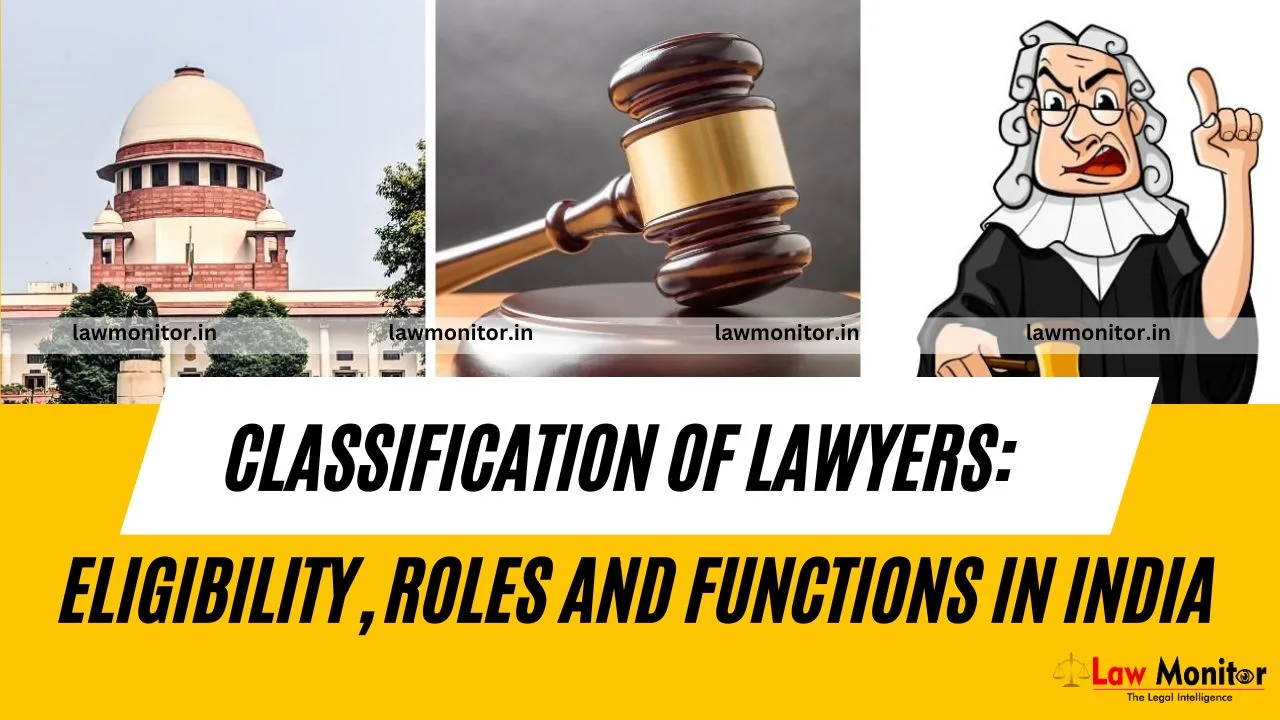CLASSIFICATION OF LAWYERS: ROLES AND FUNCTIONS

- Attorneys: Attorneys previously only referred to British attorneys or solicitors but now this definition is sometimes used to refer to advocates.
- Solicitors: Prior to enacting the Advocates Act, solicitors referred to British solicitors who were permitted to practise in the High Courts in pre-independence India. Today, in the Bombay and Calcutta High Courts there is a separate class of legal practitioners, known as solicitors, who prepare the case but do not argue in court.
- Barristers: Barristers of England had come to occupy a predominant position in the legal profession in British India. On the Original Side of the Calcutta High Court, only Barristers could practice even though the distinction between Barristers and Vakils had been removed by other High Courts.
- Pleaders: Law graduates who did not possess the additional qualification for enrolment as vakil of the High Court and non-law graduates who could pass the pleadership examination held by the High Court were given certificates enabling them to act and plead as pleaders in the district and subordinate Courts. The pleaders had entry into the High Court only after gaining experience of a certain number of years as pleaders. There were different grades of pleaders as well. This class of practitioners also does not exist today in Indian courts.
- Vakil: Vakils were native practitioners who were qualified to appear and practise in the High Courts of pre-independence India. The Legal Practitioners Act laid down additional requirements for a law graduate to be eligible to qualify as a vakil. This class of practitioners does not exist now.
- Mukhtars: Mukhtars were another class of practitioners in the subordinate courts. They were persons who had after passing the Entrance Examination corresponding to the Matriculation Examination of the later times passed the Mukhtarship Examination held by the High Court. Although their sanads or licences permitted them to practice in all subordinate courts, they were by reason of the High Court Rules and Orders, mainly confined to acting and pleading in the criminal courts in the mofussil. These mukhtars were not permitted to plead in any subordinate civil court.
- Revenue Agents: Revenue Agents were certificated and enrolled under rules made by the Chief Controlling Revenue Authority under section 17 of the Legal Practitioners Act, of 1879. Their practice was confined to revenue offices mentioned in their certificates and other offices subordinate to them.
- Advocates: this term is used to refer to lawyers qualified to practise in the Courts of India. An advocate is a person authorized to appear in a legal matter on behalf of a party. An advocate possesses a law degree and is enrolled with a Bar Council, as prescribed by the Advocates Act, 1961. Advocates are the only class of persons legally entitled to practice law or to provide legal advice. After being authorized to appear in a case by a client who has signed a vakalat, advocates prepare cases and argue them in Court.
Dress of Advocates in Court Room: When appearing in a courtroom, an advocate usually dresses in black and white and wears a band and gown.
THE ADVOCATES ACT, 1961
After the enactment of the Advocates Act, 1961 all the old categories of practitioners (vakils, barristers, pleaders of several grades, and mukhtars) were abolished and consolidated into a single category called “advocates” who enjoy the right to practice in courts throughout India.
The Advocates Act also established an All India Bar Council for the first time, with the Attorney-General and Solicitor General of India as ex-officio members of the Bar Council. The All India Bar Council has one member elected to it by each State Bar Council and it elects its own Chairman and Vice Chairman. The Act has created a State Bar Council in each State with the Advocate General of the State as an ex-officio member, and 15-25 Advocates elected for a period of five years.
Eligibility to became Advocate in India
In order to be eligible for enrolment, an Advocate must be:
- a citizen of India,
- at least 21 years of age and
- must have an LL.B degree from an Indian University.
- additional requirement of an All India Bar Examination since 2010, which Advocates must clear in order to be able to start practice.
A foreign national may be enrolled on a reciprocal basis with the country of his citizenship, and his foreign degree may be recognized by the Council for the purpose. In the absence of such reciprocity, foreign nationals cannot practice law in India. The Council has released a list of foreign degrees that
it recognizes.
Read Also: JUDICIARY NOTES CUET : Structure and Hierarchy of Courts
Training, Retirement and Removal of Judges in India’s Judicial System



